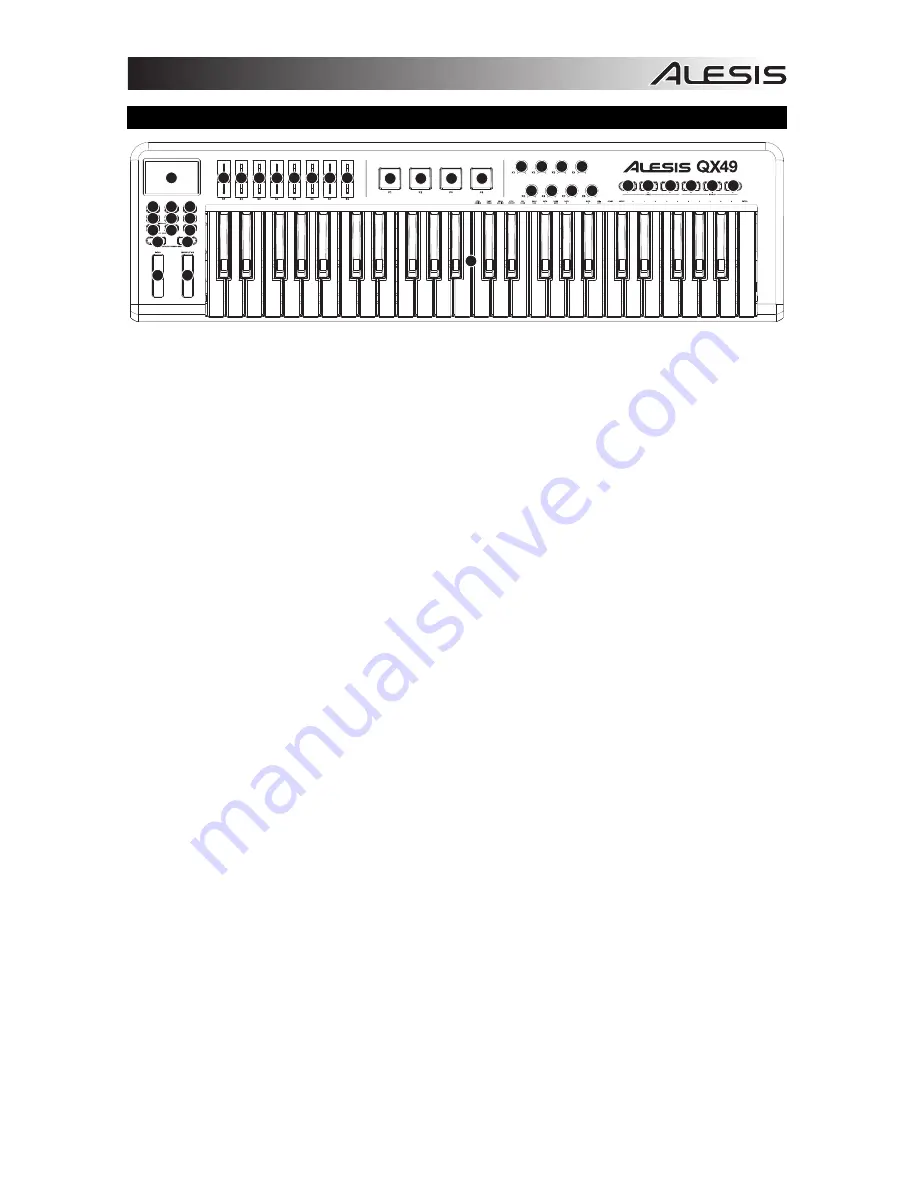
3
TOP PANEL OVERVIEW
1
3
4
5
6
6
7
8
9 10
11
11
12
13
14 14 14 14 14 14 14 14
15
15
15
15
16 16 16 16
16 16 16 16
17 17
17 17 17 17
2
1.
LCD –
Displays the data, values, settings, etc. of QX49 and its functions.
2.
KEYBOARD –
The KEYBOARD functions as a normal electronic piano keyboard during performance but can also be
used to adjust MIDI settings and send MIDI messages. The labels above the keys indicate their functions. The
numbered keys allow you to enter values for settings. Press the Enter key to confirm your selections.
3.
ADVANCED –
Press this key to access QX49's advanced or secondary functions, allowing you to assign MIDI channels,
set controls, adjust velocity curves, etc. when the ADVANCED button is engaged (i.e., when it is lit). See the
ADVANCED FEATURES section for information on selecting and entering these assignments and values.
4.
ZONE RNG –
Press this button to assign the MIDI note range of a Zone using the KEYBOARD.
5.
ZONE GRP –
Press this button then use the TRANSPORT CONTROL buttons to activate/deactivate Zones or Groups.
6.
-/+ –
Decreases/increases the value shown in the LCD by one. You can use these buttons to change the preset number
when storing or recalling presets. Press both buttons simultaneously to activate the Snapshot function, sending out the
current values of the DATA SLIDERS, MODULATION WHEEL, PITCH BEND WHEEL, KNOBS, and expression pedal (if
one is attached).
7.
MUTE –
Press this button to disable all of QX49's controls except for the KEYBOARD. "MUTE" will be shown on the
LCD. Press MUTE and NULL simultaneously to send a MIDI panic message, which resets all controls and sends an All
Notes Off message.
8.
RECALL –
Press this button to recall one of QX49's 20 available presets (01-20). When "RECALL" is flashing on the
LCD, use the -/+ buttons to select a preset. (See ADVANCED FEATURES for more information on storing presets.)
You can press RECALL and PROGRAM simultaneously to set the QX49's global MIDI channel.
9.
PROGRAM –
Press this button to change the current program (0-127). When the button is lit, you can use the -/+
buttons or the KEYBOARD's numeric keys to change the program number. You can press RECALL and PROGRAM
simultaneously to set the QX49's global MIDI channel.
10.
NULL –
Press this button to deactivate QX49's controls when calling up a new preset. Any movement of the controls will
not send MIDI data until the controls reach the position in which you left them when you last used this preset.
Essentially, this feature prevents parameter values from "jumping." Press MUTE and NULL simultaneously to send a
MIDI panic message, which resets all controls and sends an All Notes Off message.
11.
OCTAVE/TRANSPOSE UP/DOWN –
Press one of these buttons to shift the KEYBOARD's octave range up or down.
Press both buttons simultaneously then press either one of them to shift the KEYBOARD's notes up to 12 semitones in
either direction.
12.
PITCH BEND WHEEL –
Transmits MIDI Pitch Bend information to raise or lower the pitch of a note temporarily.
13.
MODULATION WHEEL –
This wheel can be used to transmit continuous controller data (CC #1 or Modulation Depth).
14.
DATA SLIDERS
–
These sliders let you send MIDI data to adjust their currently selected parameters in your software.
15.
TRIGGER PADS –
These velocity-sensitive pads will send MIDI note messages when pressed. You can use these
pads to trigger drum hits or other samples in your software.
16.
KNOBS –
These encoders let you send MIDI data to adjust their currently selected parameters in your software.
17.
TRANSPORT CONTROLS –
You can use these buttons to operate transport controls (play, stop, record, etc.) in your
software. These buttons are also used to select the keyboard's Zones and Groups.
Summary of Contents for WX49
Page 28: ...www alesis com 7 51 0329 A...


















